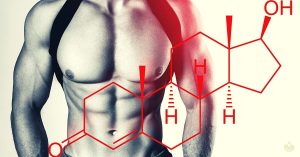Have you been feeling sluggish and lacking in energy lately? Perhaps you’ve also noticed a decline in your sex drive or even difficulty achieving and maintaining an erection. It’s easy to brush these symptoms off as a natural part of aging, but the shocking truth is that low testosterone levels could be to blame. As we delve into the connection between low testosterone and erectile dysfunction, you’ll discover why this link is often overlooked and the steps you can take to improve your sexual health. So, if you’re ready to take control of your vitality and rediscover your sexual prowess, keep reading.
Shocking Truth: Low Testosterone Levels Linked to Erectile Dysfunction
Erectile dysfunction is a problem that affects many men, and it can be caused by a variety of factors. Recently, studies have shown that low testosterone levels may be a significant contributing factor to erectile dysfunction. This is a shocking truth that has not been widely discussed in the past, but it is important information that every man should know.
What is Testosterone?
Testosterone is a hormone that is primarily produced in the testicles. It plays a crucial role in the development of male sex organs, as well as the growth of muscle and bone mass. Testosterone is also responsible for regulating sex drive, sperm production, and the distribution of fat in the body.
What Causes Low Testosterone Levels?
Low testosterone levels can be caused by a variety of factors, including aging, obesity, medication, and certain medical conditions. As men age, their testosterone levels naturally start to decrease. However, some men may experience a more significant decrease in testosterone levels due to medical conditions such as hypogonadism or diabetes.
How Does Low Testosterone Affect Erectile Dysfunction?
Testosterone plays a crucial role in the development and maintenance of sexual function. When testosterone levels are low, men may experience a decrease in sex drive and have difficulty achieving or maintaining an erection. In fact, studies have shown that men with low testosterone levels are more likely to experience erectile dysfunction than men with normal testosterone levels.
What Are the Symptoms of Low Testosterone?
The symptoms of low testosterone can vary from person to person, but some common symptoms include:
– Low sex drive
– Fatigue
– Mood changes
– Decreased muscle mass
– Increased body fat
– Erectile dysfunction
How Can Low Testosterone Levels be Diagnosed?
Low testosterone levels can be diagnosed through a blood test. This test measures the amount of testosterone in the blood, and can help determine if testosterone levels are within the normal range.
What Are the Treatment Options for Low Testosterone?
The treatment options for low testosterone may vary depending on the cause and severity of the condition. Some treatment options include:
– Testosterone replacement therapy
– Lifestyle changes, such as weight loss and exercise
– Medication to treat underlying medical conditions
– Counselling and therapy
Is Testosterone Replacement Therapy Safe?
Testosterone replacement therapy is generally considered safe when prescribed and monitored by a healthcare professional. However, there are some potential risks and side effects associated with the treatment. These may include:
– Acne
– Breast enlargement
– Sleep apnea
– Decreased testicular size
– Increased risk of blood clots
What Can You Do to Prevent Low Testosterone Levels?
There are several lifestyle changes that men can make to help prevent low testosterone levels. These include:
– Maintaining a healthy weight through diet and exercise
– Getting enough sleep
– Reducing stress
– Limiting alcohol consumption
– Quitting smoking
The Bottom Line
Low testosterone levels can be a significant contributing factor to erectile dysfunction. It is important for men to be aware of the symptoms of low testosterone and to seek treatment if necessary. With proper diagnosis and treatment, men with low testosterone levels can improve their sexual function and overall quality of life.
In addition to the symptoms mentioned earlier, low testosterone levels can also lead to decreased bone density and anemia. It is important for men to discuss any symptoms they may be experiencing with their healthcare provider to determine if low testosterone levels may be the cause.
It is also important to note that testosterone replacement therapy may not be suitable for everyone. Men with a history of prostate cancer or breast cancer, for example, may not be good candidates for this type of treatment. It is important to discuss the potential risks and benefits of testosterone replacement therapy with a healthcare provider.
In addition to medical treatments, there are also natural remedies that may help increase testosterone levels. These include eating a healthy diet that is rich in protein and healthy fats, getting regular exercise, and managing stress levels.
Overall, it is important for men to prioritize their health and seek medical attention if they are experiencing symptoms of low testosterone. With proper diagnosis and treatment, men can improve their sexual function, maintain healthy bone density, and enjoy a better quality of life.
Frequently Asked Questions
Shocking Truth: Low Testosterone Levels Linked to Erectile Dysfunction
What is low testosterone?
Low testosterone occurs when the body doesn’t produce enough of the hormone testosterone. Testosterone is responsible for many things in the male body, including the growth of muscle and bone mass, sex drive, and the production of sperm.
What causes low testosterone?
Low testosterone can be caused by a variety of factors, including aging, medical conditions like obesity or diabetes, and certain medications. In some cases, low testosterone can be genetic.
What are the symptoms of low testosterone?
Symptoms of low testosterone can include decreased sex drive, erectile dysfunction, fatigue, decreased muscle mass, and depression.
Key Takeaways
- Low testosterone can cause erectile dysfunction
- Low testosterone can be caused by a variety of factors, including aging and certain medical conditions
- Symptoms of low testosterone can include decreased sex drive, erectile dysfunction, fatigue, and depression
Conclusion
Low testosterone levels can have a significant impact on male sexual health. Men who experience symptoms of low testosterone should talk to their doctor about potential treatment options.



